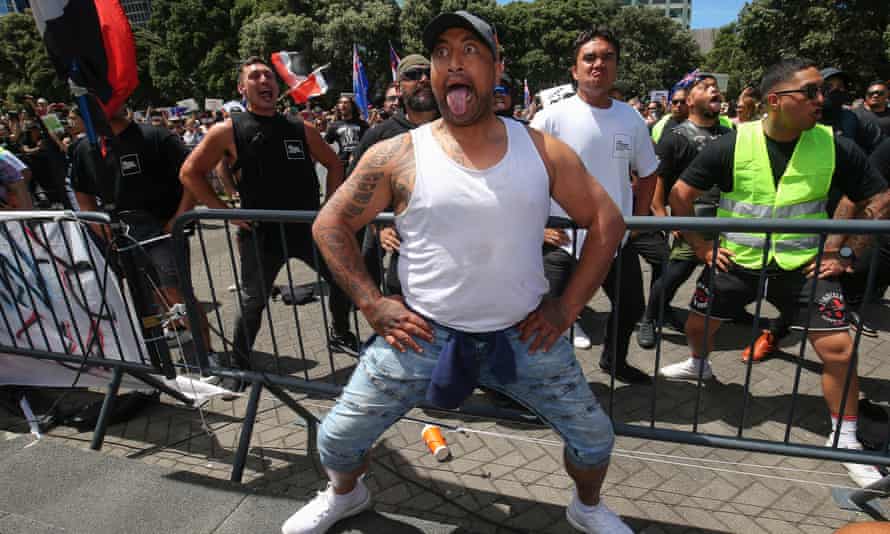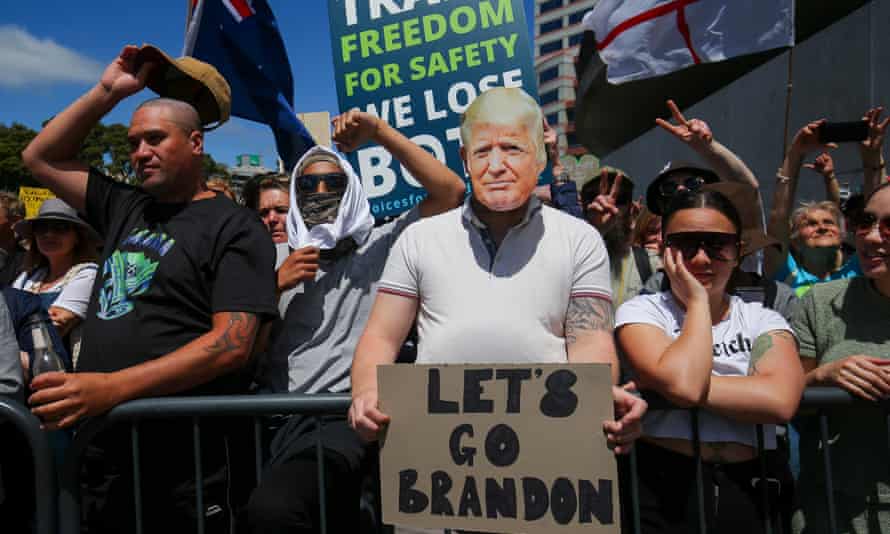
New Zealand’s parliament is on high alert after thousands of anti-vaccination mandate protesters, some threatening violence, gathered in Wellington and across the country.
As of early Tuesday, about 2,000 people had gathered in central Wellington, and almost all the gates and entrance ways to parliament had been shut off. According to Stuff,the Speaker of the house, Trevor Mallard, said it was the biggest increase in parliamentary security he had seen since his election in 1984.
In the initial stages of the protests across the country, there were attacks on both police and reporters. At the border with Auckland, which has been shut for weeks due to the Covid outbreak there, a police officer was bitten by a protester. Police said in a statement that about 50 protesters had arrived at the border, and blocked traffic for an hour.
“The actions of protesters required our staff to physically intervene to move them off the road. In the process one of our officers has been bitten by an as yet unidentified protester. Actions like this are totally avoidable and poses unnecessary risk to our staff who are simply trying do their part in preventing the spread of Covid-19,” police said in a statement.
According to Stuff, one of the country’s largest news organisations, one of their photographers was grabbed and pushed by protesters in Wellington yelling anti-media abuse.
Tuesday’s protests appeared to consist of a few thousand people, an unusually large one for New Zealand, whose government has enjoyed extremely high levels of public support for its Covid pandemic response. The prime minister, Jacinda Ardern, said that: “What we saw today was not representative of the vast bulk of New Zealanders.”
Some of the tenor of protesters’ signs and slogans had violent undertones, and echoed the Capitol riot in Washington in January – demonstrating some of the growing connections between New Zealand’s anti-vaccine mandate movement and overseas factions through social media.

A number of protesters waved large Trump flags, signs saying “we will drain the swamp” or “media treason” with a series of swastikas, or placards referencing a coming “Nuremberg trial” and depicting a noose. Some took the peculiar step of throwing tennis balls on to the parliamentary forecourt, tagged with slogans urging violence against Ardern.
Also present in the crowds were tino rangatiratanga and United Tribes of New Zealand flags, both of which are symbolic of Māori sovereignty movements. A speaker on parliament grounds said he hoped Ardern was scared, and said: “If you do decide to ignore us, you do so at your peril.” He made a series of demands including revoking workplace vaccination mandates and removing all other Covid safety restrictions. In October, the government released a new “traffic light” system for Covid management, including a legal framework for vaccination mandates that could affect around 40% of the workforce. The new rules, which begin at 90% vaccination, would loosen almost all restrictions for the fully vaccinated, but require vaccination certificates for many businesses and for workers in public-facing roles like eduction, nursing, and hospitality.

In a working paper released on Tuesday, research institute Te Pūnaha Matatini said it had observed “a sharp increase in the popularity and intensity of Covid-19-specific disinformation and other forms of ‘dangerous speech’ and disinformation, related to far-right ideologies” since the Delta outbreak and level 4 lockdown began in August. They also noted “a shift in reception to the Covid-19 vaccine from vaccine hesitancy to vaccine resistance”.
Online communities both spreading and being exposed to online Covid misinformation were often exposed to a hodge-podge of other conspiratorial claims, the researchers said. That may account for some of the mixed messaging at Tuesday’s protests, which blended QAnon narratives, Christian slogans, messages about freedom, exclusion and “apartheid” and Covid-specific concerns.
The researchers – while not writing specifically about today’s protest movement – concluded their findings “point to a broader threat: that Covid-19 and vaccination are being used as a kind of Trojan horse for norm-setting and norm-entrenchment of far-right ideologies in Aotearoa New Zealand … [including] anti-Māori sentiment, anti LGBTQIA+, conservative ideals around family and family structure, misogyny, and anti immigration”.
Opposition National party leader Judith Collins said her MPs would not be meeting with the protesters, and that she had never seen the level of security restrictions currently in place. “This is very much an anti-vaccination protest and we don’t really want to be seen with it,” Collins said.


